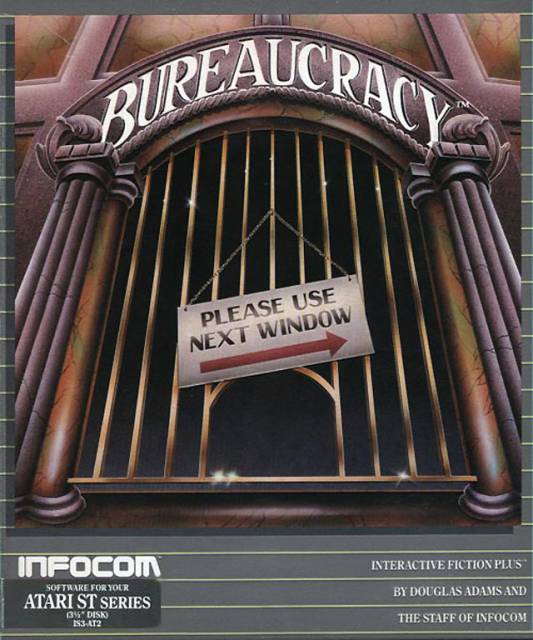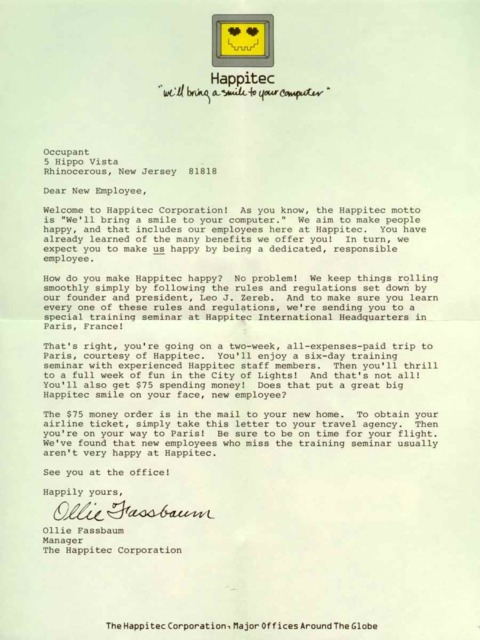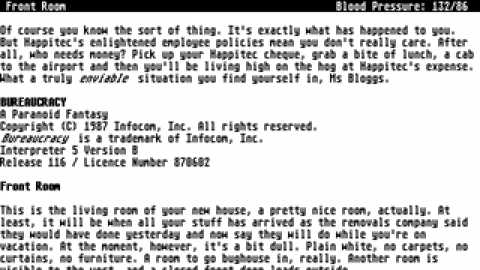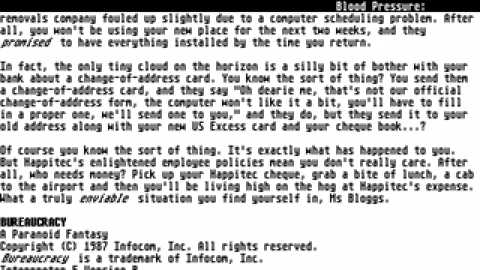Overview
Bureaucracy was the 24th game released by interactive fiction pioneers Infocom.
Development
In the early to mid-1980s, Douglas Adams's The Hitchhiker's Guide to the Galaxy had proven to be a phenomenon spanning several forms of media. Beginning as a radio show, it had become a best-selling series of books; a stage play; a TV show; and, in 1984, a hit Infocom video game. Adams remained intimately involved in the creation of all these adaptations, including the video game.
Although Infocom had planned to continue adapting the Hitchhiker's series, Adams wanted to move on to something else. Thus, the proposed Hitchhiker's sequel game (called Milliways) was postponed (ultimately never to be released), in favor of Adams's new idea, Bureaucracy. The concept was inspired by Adams's real-life struggles to get his bank to acknowledge his change of address.
Several game designers/programmers (or as the company called them, "implementors", or "imps") were assigned in turn to the Bureaucracy project, while Adams, a notoriously slow worker, produced little output. After about two years without much development progress, Adams's friend and fellow writer Michael Bywater was brought in to essentially either write or re-write the entire game.
Story/Gameplay
From the game's packaging:
Once upon a time, a man moved from one apartment in London to another. He dutifully notified everyone of his new address, including his bank; he went to the bank and filled out a change of address form himself. The man was very happy in his new apartment.
Then, one day, the man tried to use his credit card but couldn't. He discovered that his bank had invalidated his credit card. Apparently, the bank had sent a new card to his old address.
For weeks, this man tried to get the bank to acknowledge his change of address form. He talked to many bank officials, and filled out new forms, and tried to get a new credit card issued, but nothing worked. The man had no credit, and the bank behaved like, well, a bank.
It's a sad story, one that gets replayed every day for millions of people worldwide. Of course, sometimes it's not a bank at fault: sometimes it's the postal service, or an insurance company, or the telephone company, or an airline, or the Government. But all of us, at one time or another, feel persecuted by a bureaucracy.
You begin in your new house. As per the letter in your package, you will fly to Paris just as soon as you get some money to take you to the airport. That money should be in today's mail, so you should be off soon... unless, of course, there's been some problem with the mail.
Oh by the way: The man in our story about the bank was Douglas Adams, the principal author of this game. The bank did finally send him a letter, apologizing for the inconvenience - but they sent it to his old address.
"Blood Pressure"
Bureaucracy's "blood pressure" mechanic is one of Adams's few specific ideas that made it into the final product. The player's blood pressure begins at 120/80. When an event deemed to be frustrating happens -- including "meta" events such as the game's text parser failing to understand a command -- the user is informed "Your blood pressure just went up." Blood pressure decreases over time, assuming no further aggravating events occur. If the player's blood pressure ever reaches 242/141, he or she suffers an aneurysm and the game ends.
"Feelies"
As had become traditional for Infocom, Bureaucracy's packaging contained collectibles (or, as they were referred to, "feelies") to help set the mood of the game. Bureaucracy's "feelies" were:
- A welcome letter from your new employer, "Happitec". (The name of company president "Leo J. Zereb" was derived from that of Infocom CEO Joel Berez, spelling each name backwards.)
- An issue of "Popular Paranoia" magazine, a conspiracy theory magazine.
- "You're ready to move!", a brochure from "Fillmore Fiduciary Trust" explaining at absurd length (nine pages) how to register a change of address.
- An application for a credit card from Fillmore Fiduciary Trust, to be filled out "in triplicate" (although each of the three pages amusingly has completely different questions and instructions).
- A skinny pencil, with no eraser.


 Amiga
Amiga Mac
Mac PC
PC




